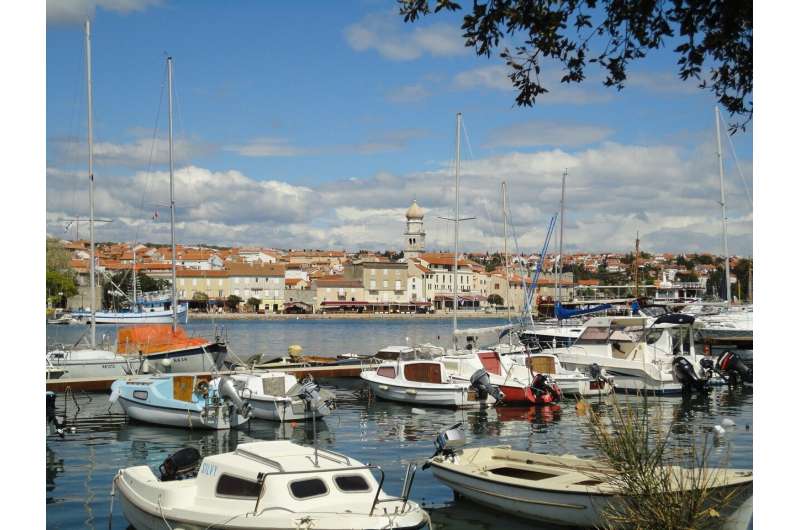This article has been reviewed according to Science X's editorial process and policies. Editors have highlighted the following attributes while ensuring the content's credibility:
fact-checked
proofread
Sustainable tourism: Solutions for sustainable water supply in booming holiday regions

In many coastal regions of Europe, tourism is an important cornerstone of a prosperous economy. This also applies to the Croatian island of Krk and the surrounding mainland, especially during the summer months. However, it is precisely during this hot and dry period that the local drinking water supply reaches its limits.
Using the example of Krk, scientists from the ISOE research group have investigated how increasing water demand can be met with the help of sustainable water management strategies. The results of the case study are available in English and Croatian as a publication with the series Groundwater Dimensions.
The Adriatic coast and the island of Krk in particular are struggling with a sharp increase in water demand, which is putting considerable pressure on water resources. Groundwater and surface water on the island and the surrounding mainland are becoming scarce and the water quality is declining.
"Like in comparable regions, the high demand for drinking water on Krk is largely caused by the booming tourism industry, but we also see that the effects of climate change in general are significantly increasing the pressure on water resources," says Robert Luetkemeier, water researcher at ISOE—Institute for Social-Ecological Research and co-lead of the regulate research group.
"Under the current conditions, water management in tourist regions is more and more proving to be a challenge since it is getting increasingly complex and prone to uncertainties."
This raises the question of what a safe and sustainable water supply could look like under these circumstances. As part of a co-design process, Robert Luetkemeier investigated this question together with his colleagues Linda Söller and Dženeta Hodžić from the regulated research group.
Local stakeholders from water management, tourism, government, and administration cooperated with scientists to develop a common understanding of the problem at hand as well as a shared vision. The aim was to exchange expertise and experience in order to arrive at practicable solutions.
This collaborative approach ultimately enabled the research group to develop suitable measures for sustainable (ground) water management together with the stakeholders.
Increased pressure on existing water resources due to tourism and climate change
The water-tourism-nexus was defined during a process lasting around three years, and in a publication on this topic, the group of authors now show the effects of climate change and tourism on water resources. The authors also explain how water can be managed in a way that ensures an adequate water supply for locals and tourists alike while protecting the ecological balance and economic vitality of the island.
"The measures developed during the co-design process include management strategies that address both the demand and supply side of water provision and aim for a sustainable and fair use of this resource," says Luetkemeier, who also heads the Research Unit Water and Land Use at ISOE.
For water suppliers, the measures offer a mix of options aimed primarily at replacing drinking water in cases when drinking water quality is not required. Accordingly, the research group recommends alternative water sources such as rainwater harvesting, water reuse or the desalination of seawater.
Including tourism in the promotion of sensible water consumption
"We need to achieve a sustainable use of water not only on the supply side, but also with regard to demand," explains Luetkemeier. "Here, regulatory measures could take effect that prevent an uncontrolled influx of tourists."
These measures could include limiting the increase in accommodation, reducing building areas and monitoring residences. The introduction of adapted water fees is also recommended, i.e. consumption-based or seasonal fees that reduce the peak demands for water use and evenly distribute the costs incurred between tourists and residents of the island.
In addition, the scientists propose awareness-raising campaigns aimed at both tourists and locals to increase awareness of the vulnerability of the island's water resources and encourage individual commitment to water conservation.
"In order for the recommended measures to be successfully implemented in the long run, it is essential for the stakeholders who have helped shape the water-tourism-nexus to continue working together," says Luetkemeier.
The stakeholders include representatives of local communities and political decision-makers, business and tourism leaders as well as scientists.
In addition to a collective commitment, the political and financial framework conditions must also be adapted to support the introduction and dissemination of alternative water sources and to ensure compliance with existing regulations and environmental sustainability.
More information: Linda Söller et al, Water Futures on Krk Island, ISOE—Institute for Social-Ecological Research (2024). DOI: 10.5281/zenodo.10907296
Dženeta Hodžić et al, Budućnosti vode na otoku Krku, ISOE – Institute for Social-Ecological Research (2024). DOI: 10.5281/zenodo.12542334
Provided by Institut für sozial-ökologische Forschung




















